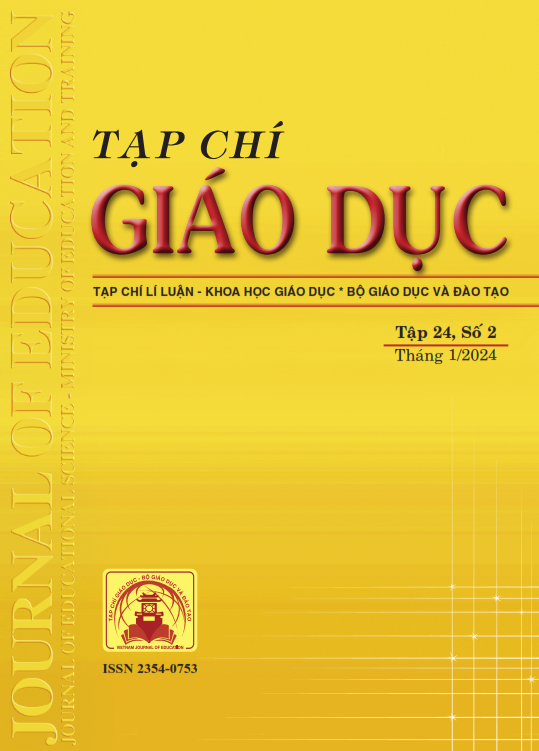Xây dựng thang đo hành vi công dân trong tổ chức của giáo viên trung học cơ sở tại Thành phố Hồ Chí Minh
Tóm tắt
Organizational citizenship behavior is considered as secondary, voluntary, work-related behaviors. Based on Organ (1988) and Podsakoff (2000) models of organizational citizenship behavior, this study develops and confirms the organizational citizenship behavior scale in the lower secondary education environment. The method of studying text documents was used to develop a new scale suitable for the Vietnamese context. The research results determine the scale of teacher's behavior, including the level of behavior in the teacher's organization towards school benefits (including behavior towards school development and towards voluntarily complying with the principles of professional groups/schools) and the level of behavior in teachers' organizations towards personal benefits (individuals oriented towards students, parents, colleagues, and self-help). The research results show that it is necessary to build a scale of civic behavior in educational organizations of secondary schools with appropriate characteristics in the Vietnamese context.
Tài liệu tham khảo
Avey, J. B., Wernsing, T. S., & Luthans, F. (2008). Can positive employees help positive organizational change? Impact of psychological capital and emotions on relevant attitudes and behaviors. The Journal of Applied Behavioral Science, 44(1), 48-70.
Bateman, T. S., & Organ, D. W. (1983). Job satisfaction and the good soldier: The relationship between affect and employee “citizenship”. Academy of Management Journal, 26(4), 587-595.
Bell, L. A. (1980). The School as an Organisation: a re‐appraisal. British Journal of Sociology of Education, 1(2), 183-192. https://doi.org/10.1080/0142569800010204
Belogolovsky, E., & Somech, A. (2010). Teachers’ organizational citizenship behavior: Examining the boundary between in-role behavior and extra-role behavior from the perspective of teachers, principals and parents. Teaching and Teacher education, 26(4), 914-923.
Bộ GD-ĐT (2021). Thông tư số 03/2021/TT-BGDĐT ngày 02/02/2021 quy định mã số, tiêu chuẩn chức danh nghề nghiệp và bổ nhiệm, xếp lương viên chức giảng dạy trong các trường trung học cơ sở công lập.
Colquitt, J. A. (2001). On the dimensionality of organizational justice: a construct validation of a measure. Journal of Applied Psychology, 86(3), 386-400. https://doi.org/10.1037/0021-9010.86.3.386
Daft, R. (2012). Organization theory and design (11th ed.). Independence, KY: South-Western College Pub.
Del Junco, J. G., Espasandin Bustelo, F., Dutschke, G. M. J., & Palacios Florencio, B. (2013). An Approach to the Design of a Scale for Measuring Happiness at Work of Iberian Companies Athens. ATINER’S Conference Paper Series.
Dipaola, M., & Tschannen-Moran, M. (2001). Organizational citizenship behavior in schools and its relationship to school climate. Journal of School Leadership, 11(5), 424-447.
Eisenberger, R., Stinglhamber, F., Vandenberghe, C., Sucharski, I. L., & Rhoades, L. (2002). Perceived supervisor support: contributions to perceived organizational support and employee retention. Journal of Applied Psychology, 87(3), 565-573.
Garg, P., & Rastogi, R. (2006). Climate profile and OCBs of teachers in public and private schools of India. International Journal of Educational Management, 20(7), 529-541. https://doi.org/10.1108/09513540610704636
Gupta, A. (2015). India: The new private sector. International Higher Education, 17-18. http://ejournals.bc.edu/ojs/index.php/ihe/article/view/7950/7101
Janssen, O., & Van Yperen, N. W. (2004). Employees' goal orientations, the quality of leader-member exchange, and the outcomes of job performance and job satisfaction. Academy of Management Journal, 47(3), 368-384.
Oplatka, I. (2006). Going beyond role expectations: Toward an understanding of the determinants and components of teacher organizational citizenship behavior. Educational Administration Quarterly, 42(3), 385-423. https://doi.org/10.1177/0013161X05285987
Oplatka, I. (2009). Organizational citizenship behavior in teaching: The consequences for teachers, pupils, and the school. International Journal of Educational Management, 23(5), 375-389.
Organ, D. W. (1988). Organizational citizenship behavior: The good soldier syndrome. Lexington books/DC Heath and Company.
Podsakoff, P. M., MacKenzie, S. B., Paine, J. B., & Bachrach, D. G. (2000). Organizational citizenship behaviors: A critical review of the theoretical and empirical literature and suggestions for future research. Journal of Management, 26(3), 513-563.
Schaufeli, W. B., Bakker, A. B., & Salanova, M. (2006). The measurement of work engagement with a short questionnaire: A cross-national study. Educational and Psychological Measurement, 66, 701-716.
Silins, H., Zarins, S., & Mulford, W. R. (2002). What characteristics and processes define aschool as a learning organisation? Is this a useful concept to apply to schools? International Education Journal, 3(1), 24-32.
Somech, A., & Oplatka, I. (2014). Organizational citizenship behavior in schools: Examining the impact and opportunities within educational systems. Routledge.
Tindle, J. A. (2012). Dimensions of principal support behaviors and their relationship to organizational citizenship behaviors and student achievement in high schools. The College of William and Mary.
Tyler, W. B. (1985). The organizational structure of the school. Annual Review of Sociology, 11(1), 49-73. https://doi.org/10.1146/annurev.so.11.080185.000405
Vitell, S. J., & Davis, D. L. (1990). The relationship between ethics and job satisfaction: An empirical investigation. Journal of Business Ethics, 9, 489-494.
Tải xuống
Đã Xuất bản
Cách trích dẫn
Số
Chuyên mục
Giấy phép

Tác phẩm này được cấp phép theo Ghi nhận tác giả của Creative Commons Giấy phép quốc tế 4.0 .












